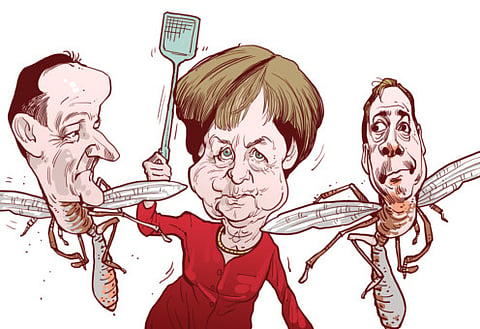New EU Parliament remains firmly pro-euro
Danger of anti-European fringe is greatly exaggerated

The new European parliament is preparing to support the governments of the mainstream member states in pooling more of their sovereignty to build a strong euro. And the danger of the anti-Europeans has been greatly exaggerated, even if these right wing racist and xenophobic parties may still have significant impact in national elections.
Despite significant wins by parties deeply sceptical of the European Union (EU) — like the far-right National Front that came first in France with 25 per cent of the vote, and the UK Independence Party that came first in Britain with 27 per cent of the vote — the dominant pro-European parties still command more than 70 per cent of the European parliament.
All national parties have to join groups in the European parliament, which wield substantial influence in managing the legislation through parliament and its committees. The largest group with 221 seats in the 751-member chamber is the European Peoples Party, which is the home of the conservatives and Christian Democrats and is dominated by the Germans under Chancellor Angela Merkel’s Christian Democrats.
This is the group that David Cameron foolishly spurned, but his quixotic move simply condemned the British Conservatives in the European parliament to irrelevance as they formed their own minority group (Conservatives and Reformers), which they share uncomfortably with the Law and Justice Party from Poland, whose social conservatism does not mesh well with the Conservatives’ economic liberalism. They only have 46 seats in the new parliament and therefore very little control over events in a parliament that values collaboration and cross-party working.
The Socialists are the second-largest party in the new European parliament with 189 seats — now dominated by the Italians as Matteo Renzi’s Democratic Party got 31 seats, beating the German Socialists who got 27.
These two huge groups dominate parliament, but the largest of the smaller groups is the Liberals with 59 followed by the Greens with 52, and four other minor groups scrambling around the fringes of parliament, including the Freedom and Democracy Group, which is the home of the anti-Europeans like Ukip and the National Front, who may not even want to play an active part in the parliament.
Real world
But in the real world, one very likely outcome is a grand coalition of the European Peoples Party and the Socialists who would have to reach some necessary compromises, but could then steamroll through the required and urgent political reforms to build a strong euro. Both groups share a view that the euro needs to be reinforced and that the whole European project is too valuable to waste.
A first test of authority will be the appointment of the new president of the European Commission, the EU’s most powerful official who runs the Commission and civil service at the heart of the Union. The appointment of this important official starts by a nomination from the governments of the 28 member states, which then has to be ratified by the European parliament.
Merkel’s European Peoples Party has declared its support for Jean-Claude Juncker, ex-prime minister of Luxemburg, who is seen as an experienced European who could manage the process of redrafting the financial and fiscal treaties that allowed the euro to get ahead of its political owners and caused the disaster that it has only just survived.
This has infuriated Cameron who has dismissed Junker in typically cavalier fashion, saying that EU had to be run by people who “get it” and understand that the EU has become “too big, too bossy, too interfering”. Sadly for Cameron, no-one in Europe cares what he thinks as he has spent most of his time in office distancing his government from European projects, so he will be reduced to using his blocking power in the European Council, where all the 28 member states meet as national governments and preserve some veto power.
Look East
But more substantial figures than the British prime minster also have doubts about Junker and rumours abound that the national leaders may look for a more high-profile consensus candidate like International Monetary Fund’s Christine Lagarde or ex-trade commissioner Pascal Lamy, who may better manage the delicate changes needed.
The new Commission and parliament also have some important decisions on how to handle relations on the EU’s eastern borders. The German-led acquiescence to Vladimir Putin’s aggressive Russia is not a recipe for lasting stability on the continent. Nato’s attempts to contain Russia by offering membership to Ukraine and Georgia needs to be balanced by a more open economic regime that respects Russia’s legitimate place in the continent of Europe, but not in the European Union.
Alternative energy supplies and a better pan-European gas grid should be a priority. This will help Germany and the EU to take a more disinterested stance over Russia and allow the EU to define a new relationship with Ukraine that will encourage open trade and liberal thinking, while at the same time not provoke Russia’s paranoia.
Creating a stronger euro, cleaner relations with the East and more transparency in EU governance, all add up to a significant agenda for the new parliament. There is a lot to do.
Sign up for the Daily Briefing
Get the latest news and updates straight to your inbox


